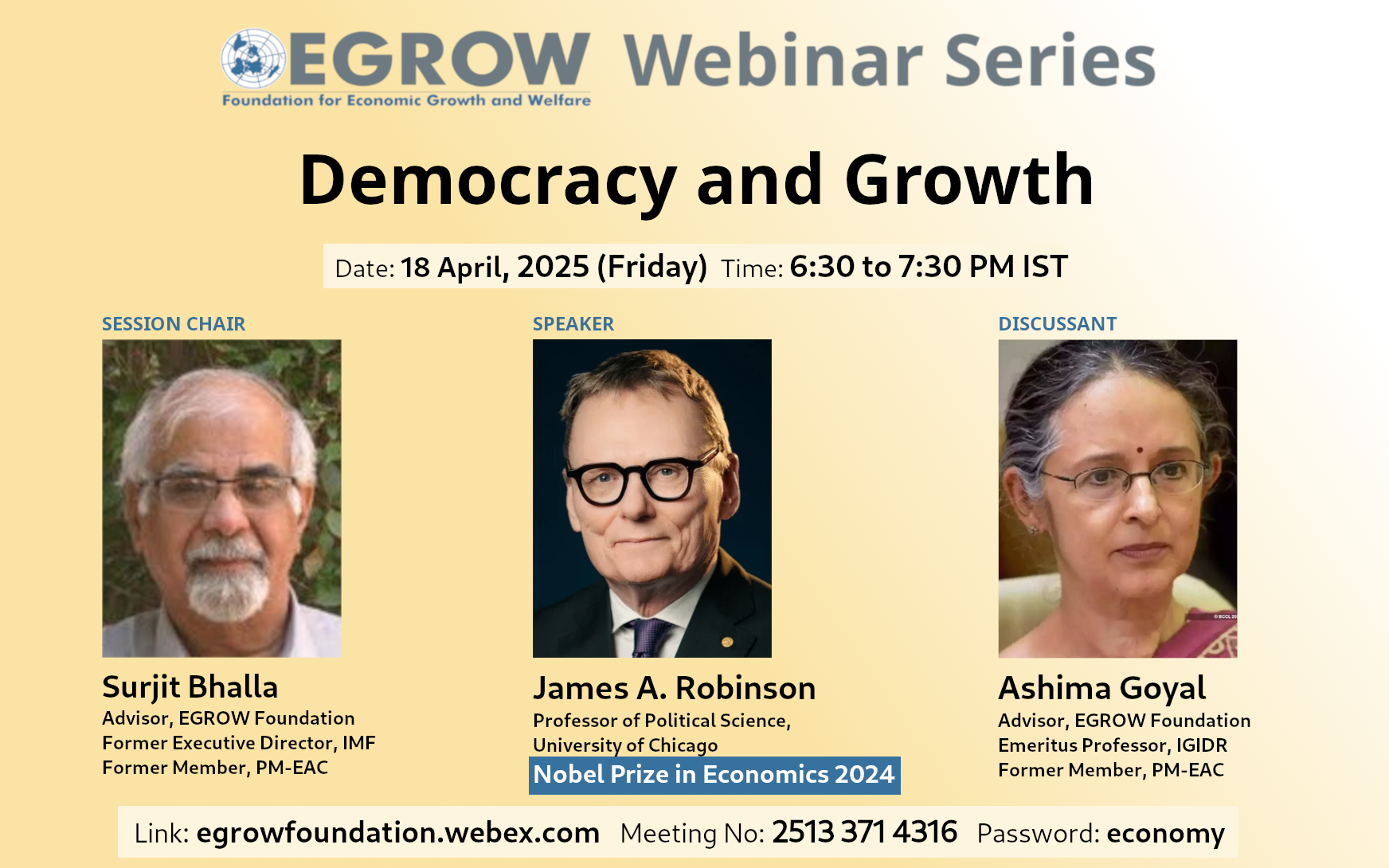Democracy and Growth

Webinar Link
Meeting No: 2513 371 4316
Password: economy
Certificate of Participants
To recieve certificates, please register and attend
Abstract
This webinar covers research that shows democracy helps increase a country’s economy. The study found that when a country becomes a democracy, its economy grows by about 20% in the long run. The benefits are seen in countries at all stages of development and happen because democratic governments tend to invest more in things like education, healthcare, and infrastructure.
About the Speakers
Surjit Bhalla
Dr. S.S. Bhalla, is a Senior India Analyst for the Observatory Group, a New York based macroeconomic policy advisory firm and Chairman of Oxus Research & Investments. In 2017, he was appointed as Member of the Prime Minister’s Economic Advisory Council. He has been a member of the Secondary Markets Advisory Committee of SEBI and the National Statistical Commission of India. Dr Bhalla writes extensively on economic issues and has recently authored another book titled, The New Wealth of Nations.
James A. Robinson
James A. Robinson, a professor of political science at the University of Chicago, is a Nobel laureate in Economic Sciences for 2024. An economist and political scientist, Robinson has conducted influential research in the field of political and economic development and the relationships between political power and institutions and prosperity. His work explores the underlying causes of economic and political divergence both historically and today and uses both the mathematical and quantitative methods of economics along with the case study, qualitative and fieldwork methodologies used in other social sciences.
Robinson has a particular interest in sub-Saharan Africa and Latin America and is a Fellow at the Institute of African Studies at the University of Nigeria at Nsukka. He taught a summer school at the University of the Andes in Bogotá between 1994 and 2022. He has conducted fieldwork and collected data in Bolivia, Colombia, Haiti, the Democratic Republic of the Congo, Nigeria, Sierra Leone, South Africa, and Zimbabwe. He has published three books co-authored with Daron Acemoglu, an Institute Professor of Economics at MIT. The first, Economic Origins of Dictatorship and Democracy, proposed a theory of the emergence of and stability of democracy and dictatorship. Their second book Why Nations Fail: The Origins of Power, Prosperity, and Poverty (translated into 41 languages since its publication in 2012), pulled together much of their joint research on comparative development and proposed a theory of why some countries have flourished economically while others have fallen into poverty. Their most recent book, The Narrow Corridor: States, Society and the Fate of Liberty, examines the incessant and inevitable struggle between states and society, and gives an account of the deep historical processes that have shaped the modern world.
Ashima Goyal
Ashima Goyal is Advisor at EGROW Foundation. She has provided consultancy to ADB, DEA, GDN, UNDP, RBI, UN ESCAP and WB. She is active in the Indian policy debate; and has served on several government committees, including the Economic Advisory Council Prime Minister and the RBI technical advisory committee for monetary policy, and boards of educational and of financial institutions. She is former Member of RBI's Monetary Policy Committee, an independent director at Edelweiss Financial Services and SBI General Insurance.
She edits a Routledge journal in macroeconomics and finance and contributes a monthly column to the Hindu Business Line. She was a visiting fellow at the Economic Growth Centre, Yale University, USA, and a Fulbright Senior Research Fellow at Claremont Graduate University, USA. Her research has received national and international awards. She won two best research awards at GDN meetings at Tokyo (2000) and Rio de Janeiro (2001), was selected as one of the four most powerful women in economics, a thought leader, by Business Today (2008); was the first Professor P.R. Brahmananda Memorial Research Grant Awardee for a study on History of Monetary Policy in India since Independence (2011), which was published by Springer in 2014; received the SKOCH Challenger Award for Economic Policy (2017); Hindu College OSA Distinguished Alumni Award and 20th FLO FICCI GR8 Beti Award for Excellence in Economics (2018).
Ashima Goyal is widely published in institutional and open economy macroeconomics, international finance and governance, with more than a hundred articles in national and international journals. She has also authored and edited a number of books including Macroeconomics and Markets in Developing and Emerging Economies (Routledge: UK. 2017) and A Concise Handbook of the Indian Economy in the 21st Century (OUP: India, 2019).